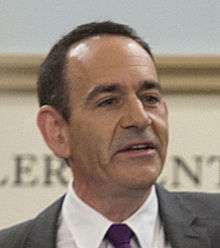Timothy Naftali
| Timothy Naftali | |
|---|---|
 | |
| Born |
January 31, 1962 Montreal, Quebec |
| Institutions |
University of Virginia, New America Foundation, New York University |
| Alma mater |
Yale University (B.A.) Johns Hopkins Univ. (M.A.) Harvard University (Ph.D.) |
| Doctoral advisor |
Akira Iriye, Ernest May |
Timothy Naftali is a Canadian-American historian and director of the Tamiment Library and Robert F. Wagner Archives at New York University.[1] From 2007 to 2011 he directed the Richard Nixon Presidential Library and Museum. He was appointed when control of the Library was transferred from the Richard Nixon Foundation to the National Archives and Records Administration.[2][3] His biggest task at the library was to present a more objective and unbiased picture of the Watergate scandal—a task completed in March, 2011, when the Library's new Watergate gallery opened and received extensive news coverage.[3] Naftali left the Nixon Library later that year.[4] He is a regular CNN contributor.
Previously Naftali's area of focus was the history of counterterrorism and the Cold War.[5][6] Before taking the Nixon Library position, Naftali had been an associate professor at the University of Virginia, where he directed the Miller Center of Public Affairs' Presidential Recordings Program.[7] In the 1990s he taught at the University of Hawaii and Yale.[8] He has written four books, two of them co-authored with Alexander Fursenko on the Cuban Missile Crisis and Nikita Khrushchev.[9]
He served as a consultant to the 9/11 Commission, which commissioned him to write an unclassified history of American counterterrorism policy. This was later expanded into his well-received 2005 book Blind Spot: The Secret History of American Counterterrorism.[10][11][12]
Naftali was born in Montreal and at one point worked as an aide to Robert Bourassa. In 2007 he told the Toronto Star that he left Canada for the US in response to Quebec's language laws: "It seemed to me that the deck was stacked against civil liberties and I preferred to be in a country where I didn't have to worry about what language I spoke."[13] He has an undergraduate degree from Yale and graduate degrees from Johns Hopkins and Harvard.[9]
Naftali is openly gay.[14][15]
Selected publications
- 1997: One Hell of a Gamble: Khrushchev, Castro, and Kennedy, 1958-1964 (with Aleksandr Fursenko): ISBN 0393040704
- 2001: John F. Kennedy: The Great Crises (edited with Philip D. Zelikow and Ernest May): ISBN 039304954X
- 2005: Blind Spot: The Secret History of American Counterterrorism: ISBN 0465092810
- 2006: Khrushchev's Cold War: The Inside Story of an American Adversary (with Aleksandr Fursenko), which won the Duke of Westminster's Medal for Military Literature: ISBN 0393058093
- 2007: George H. W. Bush: ISBN 9780805069662
References
- ↑ http://www.nyu.edu/about/news-publications/news/2013/11/12/timothy-naftali-joins-nyu-as-the-tamiment-librarys-new-director.html
- ↑ Flaccus, Gillian (July 12, 2007). "Nixon Library Transfers to Federal Control". Associated Press.
- 1 2 Adam, Nagourney (March 31, 2011). "Nixon Library Opens a Door Some Would Prefer Left Closed". New York Times.
- ↑ Whiting, David (November 17, 2011). "Nixon library director leaves mixed legacy". The Orange County Register. Retrieved 2012-03-22.
- ↑ Goldberg, Jeffrey (May 8, 2007). "The Talk of the Town: Sprucing Up Nixon". The New Yorker.
- ↑ Martelle, Scott (July 2010). "The War Over Nixon". LA Magazine.
- ↑ Lee, Christopher (April 11, 2006). "U-Va. History Professor Named First Director of Nixon Library". The Washington Post.
- ↑ http://www.cato-unbound.org/contributors/timothy-naftali/
- 1 2 http://www.nixonlibrary.gov/newsandevents/naftalibio.php
- ↑ http://journals.hil.unb.ca/index.php/JCS/article/viewArticle/2173/2574
- ↑ Lichtblau, Eric (July 10, 2005). "'Blind Spot' and 'Preventing Surprise Attacks': It Didn't Start on 9/11". The New York Times.
- ↑ Crenshaw, Martha (June 21, 2005). "Counterterrorism in Retrospect". The New York Times.
- ↑ Harper, Tim (July 11, 2007). "Reassessing the Nixon legacy". The Star. Toronto.
- ↑ Martelle, Scott (July 1, 2014). "The War Over Nixon". Los Angeles Magazine.
- ↑ Nagourney, Adam (August 6, 2010). "Watergate Becomes Sore Point at Nixon Library". The New York Times.
External links
- Official National Archives biography
- Los Angeles Times interview
- Articles by Naftali at Slate
- Blog posts by Naftali at The Huffington Post
- Appearances on C-SPAN